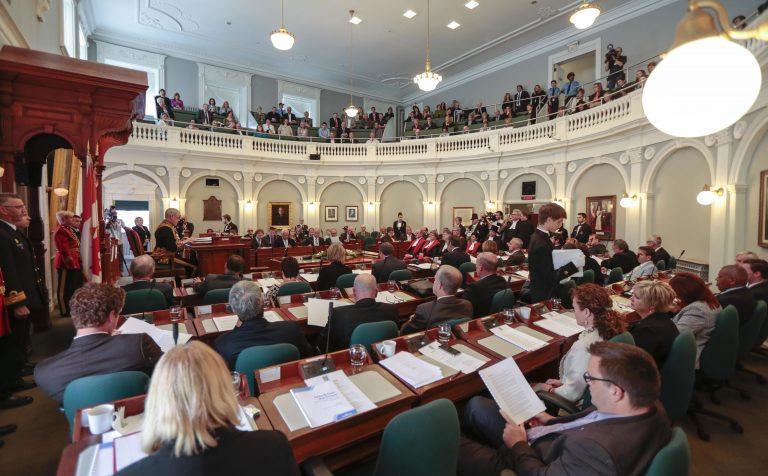There are plenty of ways to find out what is happening in the Government of Nova Scotia, but the most interesting findings rely on the inquirer knowing exactly what they’re looking for and asking for it. Most of us aren’t close enough to the centre of political action to know where to look or what to ask for.
There are plenty of ways to find out what is happening in the Government of Nova Scotia, but the most interesting findings rely on the inquirer knowing exactly what they’re looking for and asking for it. Most of us aren’t close enough to the centre of political action to know where to look or what to ask for.
Our new website, OpenHouseNS.ca, broadens access to information about how decisions are made in the Nova Scotia House of Assembly – the place political scientists Jennifer Smith and Lori Turnbull call the “elected cockpit of political life in the province.”
OpenHouseNS.ca builds on the work of the Hansard publication – a word-for-word record of every statement made by MLAs in our legislature compiled by the independent Hansard Office which does a phenomenal job of transcribing everything that is spoken in our legislature.
The volume of content produced in a typical sitting of the legislature ranges from one-to-two times the total word-count of all seven of J.K. Rowling’s Harry Potter books. The Hansard isn’t an easily searchable database and is organized chronologically, so you need to know what you’re looking for, or be prepared for a long read. Unsurprisingly, the proceedings of the legislature are in no way as captivating as Rowling’s Harry Potter novels.
Our website takes the work of Hansard further by organizing it in ways that match how people consume content online – on their computers and mobile devices. As long as you know your home address, the site points you to your MLA and gives you a record of everything they’ve said in the legislature, as far back as October 2011. Keeping track of what your MLA says in Province House is now as easy as stalking your friends on Facebook. No excuses.
The site introduces a powerful new search function that gives citizens the ability to monitor how the issues they care about are being discussed in the legislature. It makes sharing and linking to content easier, so Nova Scotians can communicate with their social networks about what’s happening in the legislature. It is a versatile platform that we imagine will be a resource for Nova Scotians to learn about our politics and will inform how people and groups engage with the provincial government.
When we first told public servants, elected officials and political insiders about our plans to build a site like this, we were met with mixed reactions. Everyone understood the value. Some wished us luck and were quiet cheerleaders for our work. Others were surprisingly suspicious about our motives, worried we would present the material in a biased way, despite the fact we shared with them numerous factors that would put our own organization in jeopardy if we were to be anything but objective. Others told us the website would not be possible, and if it were possible, would cost hundreds of thousands to millions of dollars to achieve.
Much of the coding behind our site was borrowed from the open source community and other parliamentary monitoring organizations around the world. Our work was easier because of what others were willing to share. Building the site was just a few months of labour for a single developer – far short of the six to seven figure budget we were warned we would need. We hope what we’ve done can be a model for other initiatives within government.
Nothing we’ve created is particularly new or innovative in the global context, but we’ve introduced a needed service to Nova Scotia. By giving the code we’ve generated back to the open source community, hopefully we’ve helped others in their work to make government transparent elsewhere in the world.
The reaction we received from some in government gives us concern for other worthwhile initiatives that may be shelved by decision makers in government because of false presumptions that have become accepted as truths about the achievability and feasibility of important work. There must be areas where an open source approach to policy making and service delivery across departments and between governments might help address the challenges that political and bureaucratic leadership has deemed unaffordable or impossible.
During a time when the public service desperately needs to find efficiencies and champion innovation, we encourage our friends in the legislature and the public service to push harder whenever they here the words “we can’t do that” from their colleagues. If our team had listened to the people who said that to us, our site wouldn’t exist.
In the meantime, we’ll be following what happens in our legislature, and we invite you to do the same at our Open House.
Special thanks to James at Open North for his hard work on this project.





